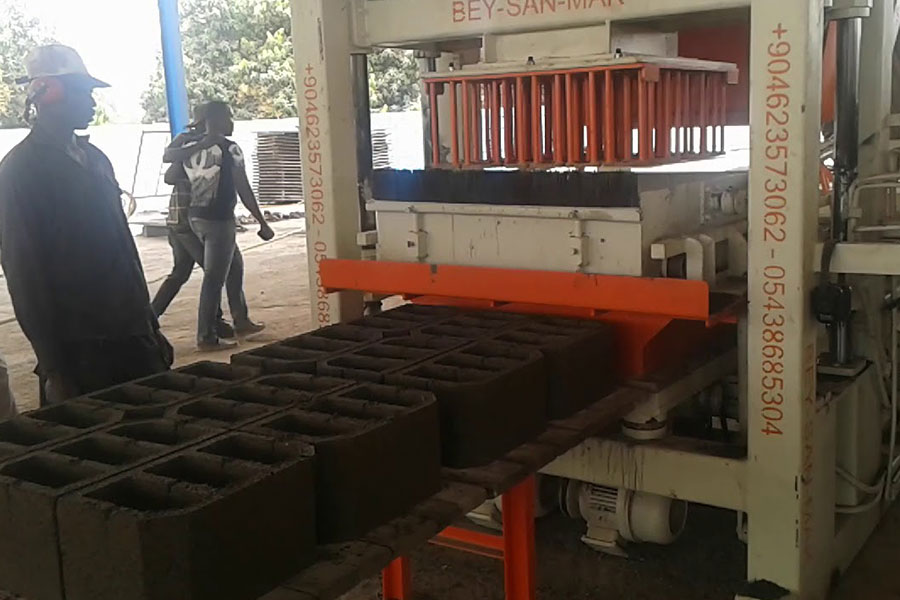
Fortune News | Jan 25,2020
Jan 1 , 2022
By SAMUEL BOGALE ( FORTUNE STAFF WRITER
)
Professionals in the construction industry will have to undergo a certification process designed to measure competency should a directive under preparation by the Ministry of Urban & Infrastructure Development be approved.
The construction industry, which contributes nearly a fifth of the country's gross domestic product (GDP), has been at the centre of the public investment-led development strategy Ethiopia pursued for the past two decades. According to the Ethiopian Statistics Service, the industry has been growing by a yearly average of 11pc and is a source of employment for five percent of the national workforce of over 41 million.
However, the quality of the labour force has become a source of concern for regulators as much as employers.
An assessment was commissioned by the Construction Management Institute, established in 2013, to determine the competence level of professionals categorised under 13 groups. The certification and licensing procedures were found insufficient to address prevailing incompetence observed in the construction industry.
Construction professionals receive certification from the Construction Works Regulatory Authority based on a regulation issued this year. They are required to submit educational, training, and work experience credentials before they receive a certificate of competency and registration. A graduate from a university engineering programme can be registered and certified as a graduate engineer. After four years of experience, they can be certified as professional engineers and a practising engineer in eight years.
However, these professionals must renew their certification every two years, including university lecturers. The directive in the making demands professionals to sit for a reexamination for competency certification when applying for renewal.
First introduced in 2008, competency-based examinations are administered to graduates of law and medicine.
The assessment carried out by Consol Construction Solutions revealed that competence has been found lacking mainly in areas that require expertise and experience in structural engineering, building services, project management skills, and design. The registration and certification process is found outdated, where the only credentials required are documents that show previous experiences and projects delivered.
There is a flaw in the system, including a lack of a screening mechanism that discerns fraudulent documents submitted to regulatory authorities, according to Tamrat Mulu, director of the Institute.
However, the study discovered that unprofessionalism in the industry is rooted in inadequate education and the absence of practice-oriented teaching in higher education institutions. Following the introduction of the 70 to 30 ratio enrolment policy instituted in 2010, 70pc of students enrolled in public universities have been studying fields related to science and technology. Almost all public universities offer engineering programmes and thousands of students graduate each year. Institutional mechanisms to verify that graduates are up to the demands of their employers in the construction industry do not exist.
The study proposes the formation of an institute to oversee the competency assessment examinations with the involvement of professional associations.
“Involvement of the associations should go further to giving the assessment examinations and issuing the certifications themselves,” said Eshetu Temesgen (PhD), president of the Ethiopian Consulting Architects & Engineers Association, and a member of parliament.
With a career spanning over three decades in the industry and now serving as deputy chair of the Urban, Infrastructure & Transport Affairs Standing Committee of parliament, Eshetu believes the proposed institute can help address the issue of professionalism, or lack thereof, in the construction industry.
Haben Abraha, a construction engineer, agrees. But he wants to see more attention given to those who prepare the examinations.
Not everyone in the industry is on the same page. Some of the practitioners see competency assessment as another bureaucratic layer.
Tewodros Shimeles, CEO of TABU Construction Plc, says it offers nothing but an additional hassle for professionals.
"I don't see it bringing a meaningful solution to the main problem in the industry, which is finance," he told Fortune.
PUBLISHED ON
Jan 01,2022 [ VOL
22 , NO
1131]

Fortune News | Jan 25,2020

Radar | May 20,2023

Fortune News | Apr 16,2022

Sunday with Eden | Aug 10,2024

Fortune News | Dec 19,2020

Radar | Jan 23,2021

Radar | Mar 23,2019

Fortune News | Jun 23,2019

Radar | Apr 03,2021

Fortune News | Apr 30,2022

Dec 22 , 2024 . By TIZITA SHEWAFERAW
Charged with transforming colossal state-owned enterprises into modern and competitiv...

Aug 18 , 2024 . By AKSAH ITALO
Although predictable Yonas Zerihun's job in the ride-hailing service is not immune to...

Jul 28 , 2024 . By TIZITA SHEWAFERAW
Unhabitual, perhaps too many, Samuel Gebreyohannes, 38, used to occasionally enjoy a couple of beers at breakfast. However, he recently swit...

Jul 13 , 2024 . By AKSAH ITALO
Investors who rely on tractors, trucks, and field vehicles for commuting, transporting commodities, and f...

Oct 25 , 2025
The regulatory machinery is on overdrive. In only two years, no fewer than 35 new pro...

Oct 18 , 2025
The political establishment, notably the ruling party and its top brass, has become p...

Oct 11 , 2025
Ladislas Farago, a roving Associated Press (AP) correspondent, arrived in Ethiopia in...

Oct 4 , 2025
Eyob Tekalegn (PhD) had been in the Governor's chair for only weeks when, on Septembe...